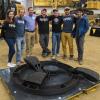Related Content
 |
Overcoming Test-Driven Damage Some say test-driven development may work well initially, but as soon as we start to refactor our code, it breaks old tests and requires us to write new ones. This is not the fault of TDD; it’s the way we’re using it. TDD remains a valuable way to verify code as we write it, so we need to repair our test-driven damage. |
|
 |
The Present and Future of AI: A Slack Takeover with Raj Subramanian Thought leaders from the software community are taking over the TechWell Hub to answer questions and engage in conversations. Raj Subramanian, who works with self-healing, AI-based test automation, hosted this Slack takeover to discuss all aspects of AI: testing it, its biases, where it is now, and where it's going. |
|
 |
Is Everything Code? As modern software processes become automated, one might argue that nearly everything in software development is code. Obviously, our software applications are comprised of code, but that’s only the start of it. Our tests, delivery orchestration, and someday even our software production could be automated. |
|
 |
Empathy-Driven Development: A Slack Takeover with Andrea Goulet Thought leaders from the software community are taking over the TechWell Hub to answer questions and engage in conversations. Andrea Goulet, the CEO of Corgibytes, hosted this Slack takeover and discussed how to help teams that want to be agile but aren't, and the importance of empathy in developing software. |
|
 |
Down-to-Earth Benefits from NASA's 3D-Printed Habitat Challenge To advance the technology needed to create sustainable housing solutions for trips to the moon, Mars, and beyond, as well as here on Earth, NASA is conducting the 3D-Printed Habitat Challenge. Teams compete to construct dwellings out of local, indigenous, or recyclable materials, and designs are out of this world. |
|
 |
Getting Faster Pull Requests in an Agile Environment Pull requests may not seem to fit into agile development, but they can work well if done right. If you can maintain feedback on your working software from frequent integration, using PRs can help people understand your code. The speed at which PRs can be reviewed depends on three things: context, size, and atomicity. |
|
 |
Choosing the Right Tools for the Job The saying “If all you have is a hammer, everything looks like a nail” summarizes a cognitive bias we have to use tools that are most familiar to us, even if they are the wrong tools for the job. Software professionals often fall into this trap. Here are some tips on how to choose the right tools for your projects. |
|
 |
What’s Next for Virtual Reality? When most of us think of virtual reality, what comes to mind is fitting on a headset to experience a computer-generated simulation of a three-dimensional environment. However, the recent TED conference had a different “shared immersive reality” experience that doesn’t require headgear. Here's what's new with VR tech. |






